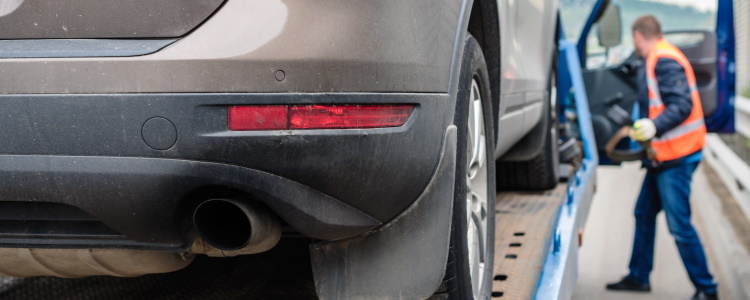Why a Cosigner May Still Owe Money on a Repossessed Car

When a vehicle is repossessed by a lender, it is usually sold at auction. This way, the lender can recoup at least a portion of the money that is owed on the loan. But, because of the way cars depreciate in value, there's a good chance that the selling price of the vehicle won't cover the entire loan balance. And any amount that remains is referred to as a car loan deficiency balance.
The primary borrower will initially be responsible for covering this deficiency. But if they can't or won't pay, the cosigner will be on the hook. At this point, the cosigner has a few options that they can pursue, and it would be unwise for them to do nothing. This is because a lender can sue them for the amount owed, and this can result in a wage garnishment or a bank account levy.
A Cosigner's Rights in the Event of Repossession
Just like with the buyer, the lender must offer full disclosure to the cosigner when a vehicle is repossessed. This means that a written notice must be delivered that makes the cosigner aware of the repo. The person who has cosigned must also receive written notices about the following:
- The Option to Redeem the Car: Before the car is sold, both the primary borrower and the cosigner must be presented with the chance to pay off the car in one lump sum.
- The Option to Reinstate the Loan: In states that allow this option, either the buyer or the cosigner may choose to get current with the loan by making a single payment. Of course, the lender must agree to this action and to the terms of the loan moving forward.
- The Auction Date and Time: If the vehicle is to be sold at auction, both the buyer and the cosigner must be made aware of exactly when and where this sale will take place.
- The Loan Deficiency Total: If the car is sold and a balance remains on the loan, this amount must appear in a written statement to both liable parties. Any repo fees being charged must also be included in this total.
If any of these written notices are not delivered correctly or in a timely manner, the cosigner may be able to pursue legal recourse. At this point, the wronged cosigner is advised to contact a lawyer.
Exceptions for Cosigners Serving in the Military
If an active member of the military cosigns a car loan that goes unpaid, they are protected under the Servicemember's Civil Relief Act of 2003 (SCRA). Under this protection, a lender may not immediately repossess a car if the cosigner is on active duty. Instead, they must obtain a court order before proceeding. Also, a creditor cannot obtain a default judgment against any debtor who is actively serving in the military.
Bankruptcy and Repossession
In the event of repossession, if the cosigner files for bankruptcy, it is likely that the lender will not be able to collect a deficiency balance from them. On the other hand, if the primary borrower files for bankruptcy after a repo, the creditor may or may not be able to collect from the cosigner. It typically depends on the type of bankruptcy being filed.
Picking Up the Pieces after Repossession
If repossession has left you with bad credit, you can still get financed to buy the car you need. At Auto Credit Express, we believe in second chances for consumers with credit issues. And we can match you with a dealership in your area that can help.
You'll get a better chance at an easier car buying experience, and it won't cost you any extra. That's because the service that we provide is free of charge. Contacting us also places you under no obligation to purchase anything. So, go ahead and fill out our simple and secure auto loan request to get started today.
















